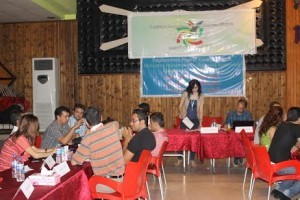Qamishly journalists demand that attacks against them stop

Political, social, and service institutions in Western Kurdistan should commit to ensuring the safety of journalists from any attacks or violations of their rights.
By Piroz Perik
Journalist Ibrahim Issa was attacked last June as he filmed the site of an explosion in the Corniche neighborhood in Qamishly.
The 29-year-old, who works for the TV channel Waar, insisted that he had not been targeted personally by the People’s Protection Units (YPG) the Kurdish militia in Syria.

His assault was simply representative of the types of violations journalists suffer from, he added.
“The assailant was arrested and the leadership of the YPG released a statement condemning this sort of behavior,” Issa told Damascus Bureau. “The statement was well received by everyone in the field. It was a great initiative to lay that groundwork for the protection of journalists.”
Asked about ways to prevent attacks on journalists in the region, Issa said, “It is very important to create a new institutional culture among the forces that control the area. This can be done through lectures and awareness-raising sessions that promote an overall framework for dealing with individuals, including journalists.”
The Waar channel works in Iraqi Kurdistan through the Western Kurdistan Journalists’ Forum, which was created by the Syrian Kurdish Journalists’ Union. Many media outlets in the area were invited to this Forum, the first meeting of which was held in Qamishly on September 13 and 14, 2014.
Participants included correspondents from the TV channels Waar, Kurdistan TV and Rudaw, as well as the radio stations Beeshfeh Ru, Hefy, Rouzna and Walat.
Also present were print media journalists from Shar, Bweer, and Ronahi, and web journalists from Yekity Media, Adar Press, Hawar Agency, Noudom, and Byam Neer.
Representatives from the Syrian Kurdish Journalists’ Union and the Union for Journalists in Kurdistan-Syria also attended, although the Union for Free Media were not present.
According to journalist Fareed Edward, 35, since its establishment in March 2012 the Syrian Kurdish Journalists’ Union has been attempting to promote journalistic freedom and democracy.
It also aims to protect journalists from arbitrary action or repression that they may face as a result of their views, or for any other reason related to their profession.
Edward, who is a member of the executive office of the Union, told Damascus Bureau that the Forum was an opportunity to understand what was really happening to journalists in Kurdish regions in Syria.
The Union considers the Forum to be “a starting point for serious and responsible efforts to create modern and appropriate legislation to govern journalism,” he said.
Most of the Forum, including the first session which was dedicated to the role of journalists, was spent in discussions of how to prevent assaults.
Many participants expressed fears that such attacks would continue, despite the fact that in Kurdish majority areas journalists have more freedom than in the parts of Syria controlled by the regime, ISIS, or even moderate elements of the Free Syrian Army.
The majority of attendees agreed it was necessary to put in place guarantees for journalists’ protection in order to prevent assault or the confiscation of their equipment.
They also stressed the need to hold perpetrators accountable and to send the Forum’s recommendations to the offices of the groups presiding over the area.
These recommendations included “working to raise the media awareness of journalists and the public, working to preserve balance and objectivity in news coverage, shedding light on problems without reservation, supporting the use of Kurdish in the media and facilitating work through press IDs granted to journalists by their institutions”.
The most prominent recommendations were those related to the protection of journalists, their freedom in choosing what issues to cover and gaining access to sources.
Summaries can be found on the Facebook page of the Syrian Kurdish Journalists’ Union as follows: “The political, social, and service authorities and institutions in Western Kurdistan should commit to ensuring the safety of journalists from any attacks or violations of their rights. They should also facilitate movement and acquiring information from sources, as well as guarantee freedom of expression in all issues without reservation.
“They should work towards holding authorities accountable for any acts that hinder the work of journalists or media outlets, including assault and confiscation of equipment. Journalists should express solidarity with their colleagues who have been subject to any sort of violation through peaceful means.”
Salwa Suleiman, the head of the Syrian Kurdish Journalists’ Union, said, “The recommendations were valuable and of a high calibre. Professionally crafted, they addressed the most prominent problems and solutions with transparency.”
Suleiman noted the absence of representatives from the Union for Free Media, saying that it raised certain questions despite their guarantee that they would attend. However, this did not demoralise those present or affect their ability to craft and apply recommendations to help build media professionalism.
Despite the difficulties that remain and the authorities’ failure to abide by the recommendations, some journalists who were present at the Forum seemed cautiously optimistic.
Akhtin Asa’ad, a correspondent for Rozna Radio, said, “I wished that there could have been a larger presence at the Forum. The absence of some may make the success of the Forum more difficult. Nevertheless the participants were able to produce new suggestions to be applied in Kurdish areas. We hope that they will be received and implemented,” he added.
